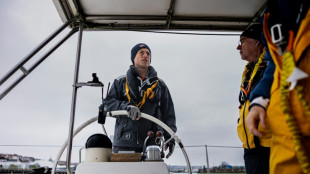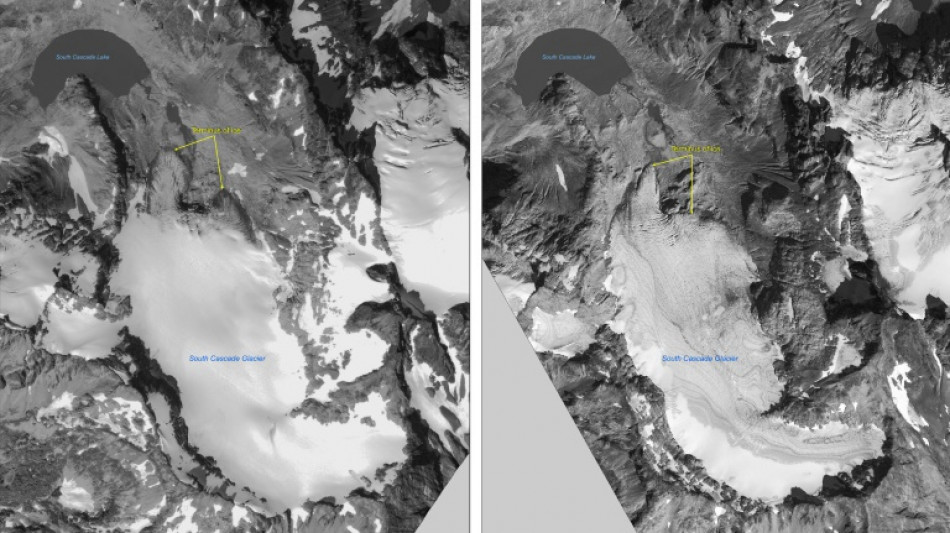
-
 Zuckerberg denies Meta bought rivals to conquer them
Zuckerberg denies Meta bought rivals to conquer them
-
Starc stars as Delhi beat Rajasthan in Super Over

-
 Weinstein asks to sleep in hospital, citing prison 'mistreatment'
Weinstein asks to sleep in hospital, citing prison 'mistreatment'
-
Amorim asks McIlroy to bring Masters magic to Man Utd

-
 Ruud keeps Barcelona Open defence on course
Ruud keeps Barcelona Open defence on course
-
Trump tariffs could put US Fed in a bind, Powell warns

-
 CONCACAF chief rejects 64-team World Cup plan for 2030
CONCACAF chief rejects 64-team World Cup plan for 2030
-
Putin praises Musk, compares him to Soviet space hero

-
 Son to miss Spurs' Europa League trip to Frankfurt
Son to miss Spurs' Europa League trip to Frankfurt
-
US senator in El Salvador seeking release of wrongly deported migrant

-
 Trump tariffs could put the US Fed in a bind, Powell warns
Trump tariffs could put the US Fed in a bind, Powell warns
-
US judge says 'probable cause' to hold Trump admin in contempt

-
 India opposition slams graft charges against Gandhis
India opposition slams graft charges against Gandhis
-
Nate Bargatze to host Emmys: organizers

-
 US Fed Chair warns of 'tension' between employment, inflation goals
US Fed Chair warns of 'tension' between employment, inflation goals
-
Trump touts trade talks, China calls out tariff 'blackmail'

-
 US judge says 'probable cause' to hold govt in contempt over deportations
US judge says 'probable cause' to hold govt in contempt over deportations
-
US eliminates unit countering foreign disinformation

-
 Germany sees 'worrying' record dry spell in early 2025
Germany sees 'worrying' record dry spell in early 2025
-
Israel says 30 percent of Gaza turned into buffer zone

-
 TikTok tests letting users add informative 'Footnotes'
TikTok tests letting users add informative 'Footnotes'
-
Global uncertainty will 'certainly' hit growth: World Bank president

-
 EU lists seven 'safe' countries of origin, tightening asylum rules
EU lists seven 'safe' countries of origin, tightening asylum rules
-
Chelsea fans must 'trust' the process despite blip, says Maresca

-
 Rebel rival government in Sudan 'not the answer': UK
Rebel rival government in Sudan 'not the answer': UK
-
Prague zoo breeds near-extinct Brazilian mergansers

-
 Macron to meet Rubio, Witkoff amid transatlantic tensions
Macron to meet Rubio, Witkoff amid transatlantic tensions
-
WTO chief says 'very concerned' as tariffs cut into global trade

-
 Sports bodies have 'no excuses' on trans rules after court ruling: campaigners
Sports bodies have 'no excuses' on trans rules after court ruling: campaigners
-
Zverev joins Shelton in Munich ATP quarters

-
 The Trump adviser who wants to rewrite the global financial system
The Trump adviser who wants to rewrite the global financial system
-
US senator travels to El Salvador over wrongly deported migrant

-
 UN watchdog chief says Iran 'not far' from nuclear bomb
UN watchdog chief says Iran 'not far' from nuclear bomb
-
Trump says 'joke' Harvard should be stripped of funds

-
 Macron vows punishment for French prison attackers
Macron vows punishment for French prison attackers
-
Canada central bank holds interest rate steady amid tariffs chaos

-
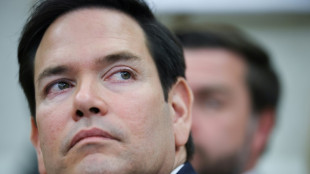 Rubio headed to Paris for Ukraine war talks
Rubio headed to Paris for Ukraine war talks
-
Australian PM vows not to bow to Trump on national interest
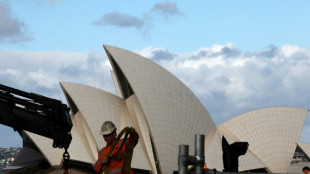
-
 New attacks target France prison guard cars, home
New attacks target France prison guard cars, home
-
Global trade uncertainty could have 'severe negative consequences': WTO chief

-
 Google facing £5 bn UK lawsuit over ad searches: firms
Google facing £5 bn UK lawsuit over ad searches: firms
-
Onana to return in goal for Man Utd against Lyon: Amorim

-
 Tiktok bans user behind Gisele Pelicot 'starter kit' meme
Tiktok bans user behind Gisele Pelicot 'starter kit' meme
-
'Put it on': Dutch drive for bike helmets

-
 China's Xi meets Malaysian leaders, vows to 'safeguard' Asia allies
China's Xi meets Malaysian leaders, vows to 'safeguard' Asia allies
-
France urges release of jailed Russian journalists who covered Navalny

-
 Gabon striker Boupendza dies after 11th floor fall
Gabon striker Boupendza dies after 11th floor fall
-
UK top court rules definition of 'woman' based on sex at birth
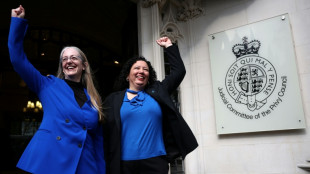
-
 PSG keep Champions League bid alive, despite old ghosts reappearing
PSG keep Champions League bid alive, despite old ghosts reappearing
-
Stocks retreat as US hits Nvidia chip export to China
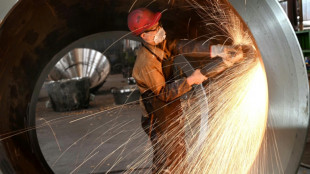

In US Northwest, South Cascade is where glacier science grew up
For nearly 70 years scientists have been probing, measuring, drilling and generally getting to know South Cascade Glacier in the US Northwest, developing and honing skills now used worldwide.
Generations of glaciologists have studied the slow-moving ice mass in Washington state, which is one of five so-called "benchmark" US glaciers, keeping tabs on how they are changing as human activity warms the Earth.
While glaciers have been studied in Europe since at least the 19th century, what scientists learned here has been invaluable.
"A lot of the scientific methods that we use to measure glaciers were developed here," said Andrew Fountain, professor emeritus at Portland State University, who specializes in glaciers and climate change.
That includes the use of ice radar, which allowed researchers to see just how thick the ice is in a spot where a glacier has probably existed for upwards of a million years.
- Ideal for studying -
South Cascade Glacier sits in a basin at the head of the South Fork of the Cascade river, which flows down ultimately into Puget Sound.
The size of the basin -- more than 2 square miles (over 6 square kilometers) -- along with its straightforward geometry made it ideal to study for scientists wanting to know how these dynamic bodies are faring in the changing world.
A glacier is a perennial accumulation of snow and ice that is always on the move, abrading the rocks underneath and -- over a long enough period of time -- carving valleys.
Measurements began at the site in 1958, according to the US Geological Survey, the government body that studies the natural environment.
The following year, the USGS began what is known as a "continuous mass balance" measurement project that keeps a running tally of streamflow runoff, precipitation, air temperature, barometric pressure, snow thickness and density, ice ablation, surface speed and surface altitude.
- Retreating -
The data collected here, as well as from the four other benchmark glaciers -- three in Alaska and one in Montana -- provides a continuous record, capturing their seasonal variations and their year-to-year changes.
Over nearly seven decades, glaciologists have been able "to track how the glacier is responding to climate."
And what they are seeing is not good, says Fountain.
"As you can imagine, it's been retreating like crazy" and is now about half the size it was when measurements started.
With a very complete record of the conditions, it's clear that the rising temperatures of the industrial age are to blame, said Fountain.
A warmer atmosphere reduces the amount of precipitation that falls as snow, and increases the ambient air temperature so what snow does fall, doesn't hang around.
While people may find it difficult to discern any long-term trends from the wildly differing amounts of snow a region can experience from year to year, a shrinking glacier is an obvious sign that the balance of nature is off.
"We can understand very viscerally that the climate is warming," he said.
Since President Donald Trump -- a climate change skeptic -- came to power, he and billionaire adviser Elon Musk have set about slashing government spending, eliminating tens of thousands of government jobs, including scientists.
This week, researchers at the Environmental Protection Agency -- which tackles environmental issues including pollution, clean water and climate change -- were put in the firing line.
For Fountain, whatever the reason a government has for diminishing the work of scientists, they should not be ignored.
About two percent of the world's water is stored in glaciers, and if they all melt, it will run eventually into the oceans, further raising sea levels and imperiling human settlements along tens of thousands of miles (kilometers) of coastlines worldwide.
That, amongst other reasons, is why the science of glaciology that came of age at South Cascade Glacier is invaluable, said Fountain.
"Just because we don't want to hear a message doesn't mean it isn't happening," he said.
C.Kreuzer--VB



